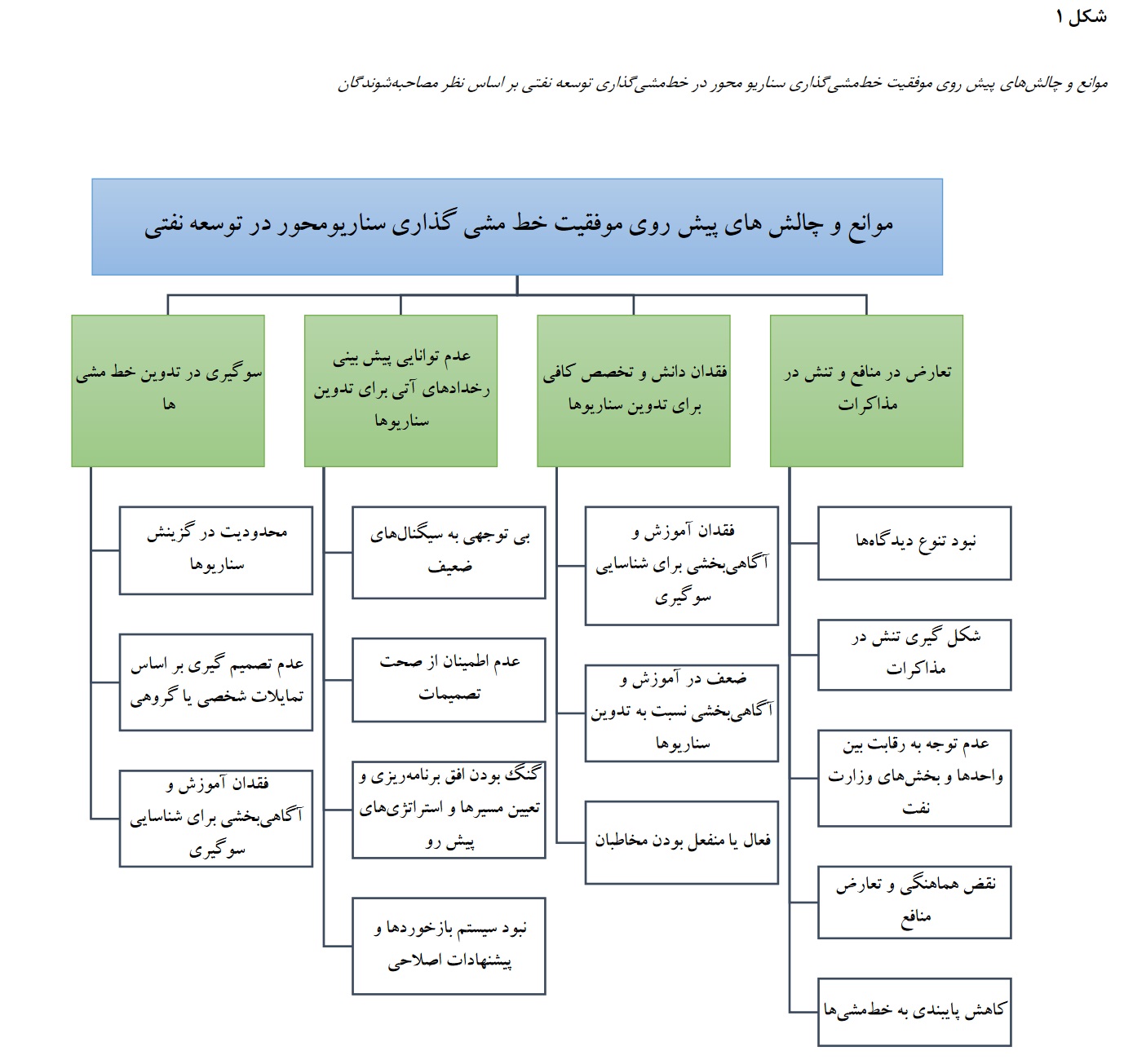Barriers and Challenges in Scenario-Based Policy Making for Oil Development Policies
Keywords:
Scenario-based policy making, oil development, bias, predicting future events, knowledge and expertiseAbstract
The objective of this study is to identify and analyze the barriers and challenges facing scenario-based policy making in the context of Iran's oil development policies. This research examines the sources of bias, the ability to predict future events, the level of knowledge and expertise available for scenario development, and the conflicts of interest and negotiation tensions. This qualitative study utilized semi-structured interviews and the Delphi technique to collect data. Initially, Delphi questionnaires were distributed among 20 senior managers from the Ministry of Oil and academic experts. Data were collected through semi-structured interviews and analyzed using NVivo software. The Delphi technique was conducted in three stages to achieve theoretical saturation. The findings of this study revealed four main concepts as barriers and challenges to scenario-based policy making in Iran's oil development: bias in policy formulation, inability to predict future events, lack of sufficient knowledge and expertise for scenario development, and conflicts of interest and negotiation tensions. These challenges can lead to reduced quality and effectiveness of policies. The results indicate that identifying and managing biases, improving predictive capabilities, increasing knowledge and expertise in scenario development, and managing conflicts of interest and tensions can enhance the scenario-based policy making process. Educational and awareness programs, feedback systems, and predictive analysis can be effective in this regard.
Downloads
References
Aier, S. (2014). The role of organizational culture for grounding, management, guidance and effectiveness of enterprise
architecture principles. Information Systems and e-Business Management, 12(1), 43-70.
https://doi.org/10.1007/s10257-012-0206-8
Aier, S., & Saat, J. (2011). Understanding processes for model-based enterprise transformation planning. International
Journal of Internet and Enterprise Management, 7(1), 84-103. https://doi.org/10.1504/IJIEM.2011.038384
Alibeygi, J., Jalalian, H., Azizpour, F., & Mahdizadeh, H. (2018). Preparing the map of main drivers for the strategic
future study of the effects of the implementation of the Arid Areas Project on Mehran and Godarkhosh plains in line
with planning management. Strategic Management Researches, 70(24), 145-167.
http://sanad.iau.ir/fa/Article/1095453
Armstrong, M., & Taylor, S. (2006). Human resource management practice. Distributed Computing (10th ed.).
https://doi. org/10.1002/9781118802717.
https://www.academia.edu/download/60118458/Armstrong_s_Essential_Human_Resource_Man20190725-
-ex0g7s.pdf
Asemannasab, B., & ghadami, m. (2021). Knowledge Management in the future. Journal of Strategic Management
Studies, 12(46), 221-235. https://www.smsjournal.ir/article_113099_b28b0f7c6b9d5155afbdaf4f513dc4fd.pdf
Boudreau, J. W., & Ramstad, P. M. (2005). Talentship, talent segmentation, and sustainability: A new HR decision
science paradigm for a new strategy definition. Human Resource Management, 44(2), 129-136.
https://doi.org/10.1002/hrm.20054
Faeni, D. P., Puspitaningtyas Faeni, R., Alden Riyadh, H., & Yuliansyah, Y. (2023). The COVID-19 pandemic impact
on the global tourism industry SMEs: a human capital development perspective. Review of International Business
and Strategy, 33(2), 317-327. https://doi.org/10.1108/RIBS-08-2021-0116
Hafez, H. M., & Attia, Y. A. (2020). Challenges to the poultry industry: Current perspectives and strategic future after
the COVID-19 outbreak. Frontiers in veterinary science, 7, 516.
Hamadamin, H. H., & Atan, T. (2019). The Impact of Strategic Human Resource Management Practices on Competitive
Advantage Sustainability: The Mediation of Human Capital Development and Employee Commitment.
Sustainability, 11(20).
Hamidi, A., Faghihi, A., & Teimoornezhad, K. (2024). Identifying and Ranking Factors Affecting Policymaking of Public
Administrators' Education. Public Management Researches, 16(62), 63-96.
https://doi.org/10.22111/jmr.2022.42740.5807
Jafarpour Marzouni, Z., Khorsandi Taskoh, A., & Abdollahinejad, A. (2022). The skills and effective factors on
improvement of university educational departments performance in the network community. Quarterly Journal of
Research and Planning in Higher Education, 28(3), 1-23. https://doi.org/10.52547/irphe.28.3.1
Kurniadi, D. (2024). Influence of Human Capital, Emotional Intelligence and Self Efficacy to Employee Performance
Moderated by Organizational Citizenship Behavior (Ocb) in Politeknik Pelayaran Malahayati Aceh. Kuey.
https://doi.org/10.53555/kuey.v30i5.2477
Mehmood, K. K., & Hanaysha, J. R. (2022). Impact of Corporate Social Responsibility, Green Intellectual Capital, and
Green Innovation on Competitive Advantage. International Journal of Human Capital and Information Technology
Professionals. https://doi.org/10.4018/ijhcitp.293232
Nie, X. (2024). Human Capital impact on productivity in Chinese enterprises: analyzing the mediating role of innovation.
https://doi.org/10.21203/rs.3.rs-4016817/v1
Nonahal Nahr, A. A., & Rahnama Roodposhti, F. (2018). Contingent Performance Assessment Measures Design Based
on Futurology: A Theoretical Approach. Journal of Future Studies Management, 29(1), 67-91.
https://www.magiran.com/paper/1844295
Rezaei Mirghaed, A., Seyed Naghavi, M., Dehghana, H., & Amiri, M. (2017). Investigating and determining the human
resources productivity functions based on the architecture of human resources model. The Journal of Productivity
Management, 1(11), 185-220. http://sanad.iau.ir/fa/Article/976268
Rezazadeh, M., Hosseinzadeh, B., & hosseini daroon kalaie, z. (2023). The Designing a Model of Effect of ResearchBased Teaching Management on Metacognition Management with Mediating Role of Organizational Climate (Case
Study: Mazandaran Education Department). Sociology of Education, 9(1), 215-230.
https://doi.org/10.22034/ijes.2023.560574.1345
Roos, G., & Pike, S. (2018). Intellectual capital as a management tool: essentials for leaders and managers. Routledge.
Roos, G., & Roos, J. (1997). Measuring your company's intellectual performance. Long Range Planning, 30(3), 413-426.
https://doi.org/10.1016/S0024-6301(97)90260-0
Salman Al-Oda, A. H., Sadeghi, M., Al-Murshidi, R. H. A., & Sharifi, S. (2024). Investigating the Relationship Between
Talent Management Implementation Categories in the Basra Province Education Organization [Research Article].
Iranian Journal of Educational Sociology, 7(1), 1-9. https://doi.org/10.61838/kman.ijes.7.1.1
Samadzad, S., & Hashemi, M. (2022). Human Capital Externalities and Productivity in Cities. International Journal of
Innovation in Management, Economics and Social Sciences, 2(4), 20-32. https://doi.org/10.52547/ijimes.2.4.20
Torres, A. I., Ferraz, S. S., & Santos-Rodrigues, H. (2018). The impact of knowledge management factors in
organizational sustainable competitive advantage. Journal of Intellectual Capital, 19(2), 453-472.
https://doi.org/10.1108/JIC-12-2016-0143
Tshukudu, T. (2021). Human Capital as a Determinant of Organisational Competitiveness. Administratio Publica, 29(4).
score%20card%20benefit%20assessment%20framework%20indicator%20set%20The%20case%20of%20the%20
South%20African%20National%20Roads%20Agency%20Ltd%20SOC%20research%20and%20development%20
programme_Dec_2021.pdf?sequence=1&isAllowed=y#page=169

Downloads
Published
Submitted
Revised
Accepted
Issue
Section
License
Copyright (c) 1403 Journal of Technology in Entrepreneurship and Strategic Management (JTESM)

This work is licensed under a Creative Commons Attribution-NonCommercial 4.0 International License.










